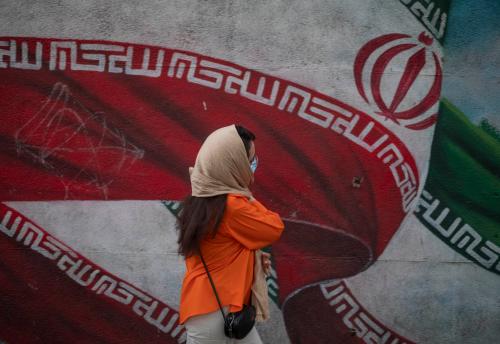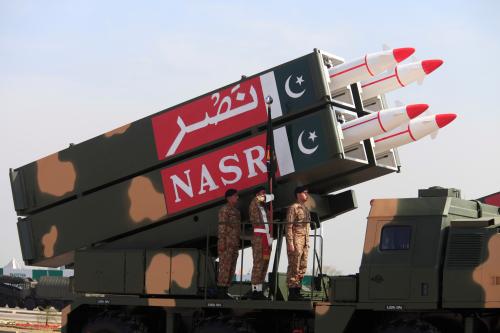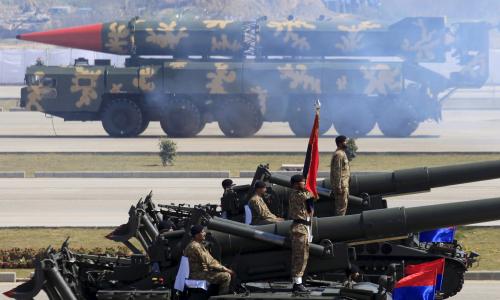Although the post-September 11 U.S. counterterrorism effort has not directly involved Northeast Asia, key players in the region have nevertheless felt its effects in ways that will have significant long-term security implications for their relations with the United States. In the aftermath of the September 11 attacks, U.S. security relationships with Japan, China, and North Korea continue to change in important ways. Though the three countries are somewhat peripheral to the core counterterrorism campaign in Central and Southwest Asia, Washington will need to manage its relations with Tokyo, Beijing, and Pyongyang carefully to keep them from diminishing or diverting its attention from the global war on terror.
Japan’s Changing Role
One of the most closely watched post-September 11 development for Northeast Asian security was the Japanese response to American calls for help. Japan took dramatic steps to allow for the use of its defense forces far from Japanese shores in a noncombat, combat-support role side-by-side with the United States and other allies. The debate over Japan as a “normal country” and the reinterpretation of its peace constitution was already under way well before September 11. Many mainstream politicians, including Prime Minister Koizumi Junichiro himself, were on record as supporting a more robust security role for the Japanese Self-Defense Forces. And yet a pervasive aversion to matters military constrained concrete action in the security realm for Japan.
Following September 11, however, Tokyo sought a greater role for Japan in the counterterror effort. Immediately following the attacks, the Japanese prime minister ordered tightened security at U.S. bases in Japan and provided new aid to Pakistan to alleviate the refugee crisis brewing there. Koizumi was among the first world leaders to visit Washington and consult with U.S. counterparts about a joint response. In mid-October, the Japanese Diet launched a debate over how Japan should assist the counterterror campaign within the parameters of the peace constitution. Supporters of a more robust Japanese role pointed to the unanimous United Nations Security Council Resolution 1368, adopted the day after the attacks on New York and Washington, urging the international community “to take all necessary steps to respond to the terrorist attacks of 11 September 2001.” The broad backing of the international community made it easier for the Self-Defense Forces to take on a noncombat role in support of the counterterror effort. To alleviate possible tensions in the region, Koizumi visited China and South Korea in the fall to explain his vision for Japan’s security role in the crisis and to issue new apologies for Japan’s aggression in the first half of the 20th century.
In the end, Japan avoided a divisive debate over interpretation of the constitution, and Koizumi pushed ahead in the Diet to pass a counterterrorism law in October. The measure allows the Japanese Maritime Self-Defense Force to provide logistics, supply, transportation, and communication assistance to U.S.-led forces, but requires Japanese vessels to operate only in noncombat areas. The plan, launched in November, foresees the use of up to six destroyers along with four C-130 Hercules transport planes, with an extension and expansion of Japan’s role possible depending on the situation. Self-Defense Force personnel would be allowed to operate on the British island of Diego Garcia in the Indian Ocean, on the Hawaiian island of Oahu, and on Guam. From these locales, Japanese Self-Defense Forces would ferry supplies, food, and fuel to the counterterrorism forces. Japanese military personnel would also take up more logistical duties for American bases in Japan so that U.S. ships and planes could be deployed to combat areas around Afghanistan.
However, while important symbolically, as well as in making a useful logistical contribution, Japan’s deployments are in many ways the exception that proves the rule. The Japanese military aircraft and naval vessels are kept many hundreds of miles out of harm’s way, though neither the Taliban nor al Qaeda have air forces or navies. Indeed, a more robust deployment of Japanese Aegis-equipped destroyers was prevented by opposition Diet members in Tokyo. But whether one sees Japan’s expanded military role as a glass half-empty or half-full, it underscores the difficulty Washington will have in encouraging a more active Japanese security contribution to regional stability in all but the most direct threats to Japan in Northeast Asia.
On the other hand, Japan is active on nonmilitary matters relating to postwar Afghanistan as well. Consistent with its peace constitution and its status as the world’s largest donor of development aid, Japan agreed to join the United States as co-chair of the November 2001 Washington assembly of the Senior Officials Meeting on Reconstruction Assistance to Afghanistan. At the meeting, which included South Korea, Turkey, Germany, Australia, China, and India, among others, Japan agreed to host the first ministerial-level meeting on postwar reconstruction assistance to Afghanistan in Tokyo last January. As the single largest donor of development aid to Central Asian states for many years, Japan is poised to expand its nonmilitary role in regional affairs.
China’s Uncertain Position
China’s role in the post-September 11 security environment has been largely positive and forward-looking, but within limits. The United States and China have viewed each other more favorably since September 11, but the gains remain fragile and tentative. China backed the relevant UN Security Council resolutions for the use of force against terrorism by the United States, sent a delegation of counterterror and intelligence experts to consult with counterparts in Washington, beefed up security along its border with Afghanistan to keep Taliban and al Qaeda supporters from slipping into China, and took steps to freeze assets associated with terrorist organizations that may have been sitting in Chinese and Hong Kong banks. Further limited U.S. cooperation with Beijing has mostly involved continued diplomatic and political support among China’s friends both in Central and South Asia and on the international scene—and possibly intelligence sharing.
China has its own interests in fostering this cooperative approach with the United States. Beijing rarely wants to be on the “wrong side” of international opinion and certainly recognizes this opportunity to build a more constructive and positive relationship with Washington. Of course, China has its own problems dealing with radicalized separatists in the Turkic-speaking regions of its far northwest province of Xinjiang, where Islamic fundamentalism is making inroads. According to Vice-Premier and foreign policy éminence grise Qian Qichen, some 1,000 Chinese Muslims had been trained in Afghani camps run by Osama bin Laden’s al Qaeda network. China also shares an interest with the United States in assuring the stability of Central and South Asia, especially Pakistan, a quasi-ally that Beijing has assisted in becoming a nuclear weapons state armed with ballistic missiles. China will bear an enormous responsibility if these weapons fall into the wrong hands. China also has a big stake in the right outcome in Afghanistan—a country with which it shares a border—and in restive Central Asia overall.
But China’s reactions to September 11 have not all been so straightforward. Many aspects of the American-led effort to combat terrorism are precisely those that have increasingly troubled China about its security situation vis-à-vis the United States in recent years. Indeed, in some ways the antiterror campaign may make Beijing even more anxious. For example, Beijing can only watch with some concern as the United States revitalizes and strengthens its alliances with Japan and Australia to deal with terrorists and the states that give them safe haven. The counterterrorism effort will also justify renewed defense ties between Washington on the one hand and Manila, Singapore, Kuala Lumpur, and Jakarta on the other, especially the Philippines, where Washington has posted some 600 military personnel in a counterterror effort. A growing U.S. military presence in Central Asia may reverse years of meticulous Chinese diplomatic effort to extend its influence in this region. And a U.S. move to expand the counterterror effort by intervening militarily in other states such as Iraq would likely meet increasing criticism from China, a traditional defender of sovereignty in the developing world.
Changing U.S.-Russia relations since September 11 may also present some challenges to Chinese foreign policy. Over the past decade, China had assiduously courted its northern neighbor and instituted a regularized channel of Moscow-Beijing summitry. Step-by-step, China had worked to institutionalize and strengthen relations with Moscow: settling and demilitarizing borders, fashioning a “strategic partnership,” establishing the Shanghai Cooperation Organization, and concluding a bilateral “Treaty of Good Neighborly Friendship and Cooperation” signed in July 2001. China saw in its warming relationship with Moscow an opportunity to counterbalance its concerns over growing American power and unilateralism and a partner with which to rail against such issues as U.S. missile defense plans. But since September 11, Putin appears to have firmly linked his country’s future to the fortunes of its relations with the West generally and with the United States in particular. Beijing risks being left behind in the counterterror effort, while the United States and Russia move in pragmatic and concrete ways to deal with terrorist problems.
North Korea’s Precarious Dilemma
September 11 had a particularly strong effect on U.S.-North Korean relations. Following an important policy review in the spring of 2001, the Bush administration announced its openness to a comprehensive and mutually beneficial dialogue with North Korea, “anytime, anyplace.” But the administration seemed unlikely to consider a dialogue without the prospects for concrete concessions on North Korea’s part—inspection regimes, verifiable arms reductions and arms control agreements, and results-based reconciliation talks between Pyongyang and Seoul. In short, the Bush administration appeared prepared to wait for Pyongyang to make the first move.
The events of September 11 prompted Washington to push North Korea a little harder. Early in 2002 the U.S.-North Korean dynamic shifted—as signaled most clearly by President Bush when, in his State of the Union address in January, he included North Korea in the “axis of evil.” While criticized by some for its harshness, the assertion highlighted how seriously the administration takes the possibility that states that sponsor terror and pursue weapons of mass destruction might purposely or inadvertently enable terrorist organizations to develop such weapons and use them against the United States. Though reports from the U.S. government acknowledge that Pyongyang’s links to terrorism have faded in recent years, nevertheless, the Bush administration was sending a warning.
Following closely on the heels of that speech, leaks of the new U.S. Nuclear Posture Review pointed to a more clearly defined set of considerations for the use of nuclear weapons against states believed to have weapons of mass destruction—states such as North Korea. Then, in March, the Bush administration announced it would not certify North Korea’s compliance with the 1994 U.S.-North Korea Agreed Framework, which governs Pyongyang’s continuing status as a nonnuclear weapons state. The U.S. move grew out of concerns that North Korea may have hidden some nuclear materials from inspectors before the verification measures of Agreed Framework were fully implemented, that Pyongyang was not allowing special inspections of its nuclear facilities to take place in a timely manner, and that little had been done by the North to meet its Agreed Framework obligation to implement a denuclearization accord it had reached with Seoul in 1992.
Going into the spring of 2002, some of the mounting pressure on Pyongyang appeared to be paying off. Official North-South discussions had resumed for the first time in six months, some Pyongyang political leaders spoke of economic reforms, and there were rumblings that North Korea was seeking to reopen dialogue with Washington. But with Washington so seriously targeting terrorism and weapons of mass destruction, the United States would be unlikely to take North Korea at its word without more concrete evidence of real change. Pyongyang may be tempted to threaten a return to nuclear and missile blackmail if it does not get the attention and inducements it wants from Washington. If the past is any guide, fruitful discussions with Pyongyang would be difficult under any circumstances. In the post-September 11 environment, the two sides’ positions might be all the more hardened.
U.S. Policy in the Region
Though perhaps peripheral to the core counterterrorism campaign, developments in these three countries could appreciably help or hinder that effort. Washington will need to keep its Japanese ally informed about the future direction of the counterterrorism campaign so it faces no “surprises.” Japan’s unwavering support for U.S. military action cannot be taken for granted. Like other allies, Japan will likely take a very cautious attitude toward any dramatic expansion of U.S. force against other countries, such as Iraq. Yet for the longer-term success of the war on terrorism and the health of the U.S.-Japan alliance, Washington should work hard to retain strong Japanese support.
The Bush administration should continue to build a reservoir of trust with Beijing—small as it may be—as partners facing the common challenge of terrorist activity in Asia. China’s relations with several key states in the region, such as Pakistan and Iran, are better established than Washington’s and can be leveraged in favor of U.S. interests if managed correctly. At a minimum, Washington needs to work with Beijing to bolster China’s commitment to keep weapons of mass destruction out of the wrong hands, especially hands to which China is known to transfer sensitive technologies, such as North Korea, Pakistan, and Iran. Washington should offer appropriate reassurances about its plans in Central, South, and Southwest Asia to keep Beijing from getting the mistaken impression that such activities in its own “backyard” are ultimately aimed at China.
Finally, Pyongyang cannot be allowed to distract American attention away from the global counterterror effort by instigating a crisis of its own. Strengthening the trilateral consultative mechanism among Washington, Seoul, and Tokyo vis-à-vis Pyongyang, while also harmonizing policies with Beijing and Moscow, will present the North with the kind of “united front” it will have difficulty challenging.



Commentary
September 11 and Northeast Asia: Change and Uncertainty in Regional Security
June 1, 2002